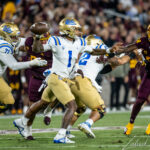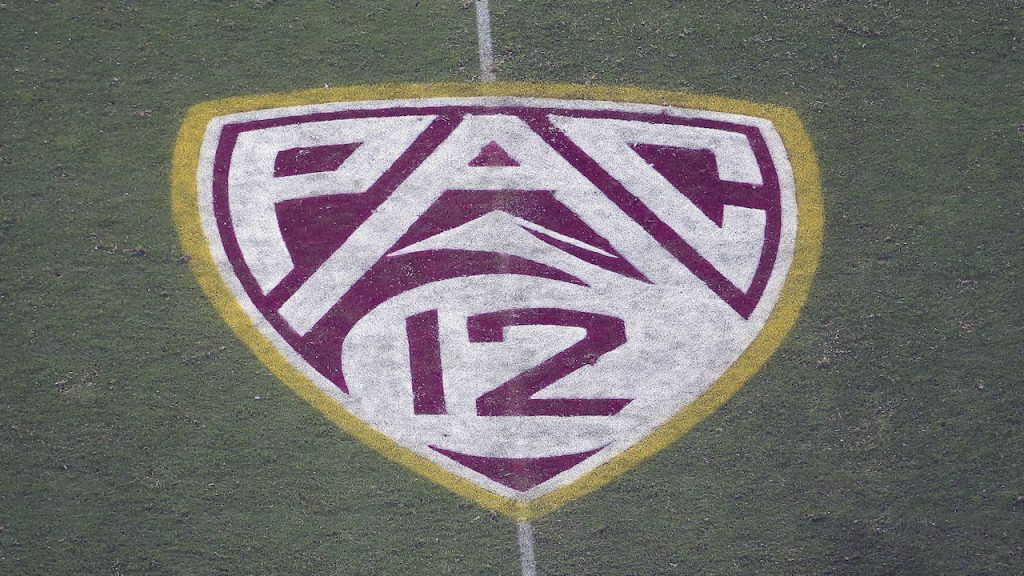The Pac-12’s pursuit of a media rights contract, which began more than eight months ago in the middle of a roiling summer, is “close to being resolved,’’ according to a university president who sits on the Pac-12 Board of Directors’ executive committee.
And Washington State’s Kirk Schulz has a timeframe in mind.
“My sense is we need to get it done in March — in mid-March, hopefully,” Schulz told the Hotline on Monday. “The longer it goes, the more noise there will be.”
There is already plenty of noise, with frequent reports speculating about a disappointing media contract and frustrated schools seeking salvation in the Big 12.
The public narrative became so bleak last week that the presidents issued a joint statement of unity. Schulz knew it carried a “damned if you do, damned if you don’t” component.
“I thought people would see it as the same thing a head coach does when he says publicly that he loves his staff, then he fires them all,” Schulz said.
“But we were getting battered constantly with all the rhetoric out of the Big 12 (region), with talk that schools were leaving … At the least, we had to let people know the 10 Pac-12 schools were committed to staying together.
“But the speed with which (the presidents) were willing to put that out — I was stunned by my colleagues. Somebody said, ‘We should do something,’ and within an hour, everyone was saying yes … Normally, everyone wants to be a wordsmith.”
Schulz’s grasp of the college sports landscape ranks with that of any president in the Power Five.
He was Kansas State’s boss when the Big 12 lost Nebraska (to the Big Ten), Missouri (SEC) and Colorado (Pac-12).
He’s a member of the College Football Playoff Board of Managers and played a key role in expanding the event.
And he’s on the Pac-12’s executive committee, along with Stanford’s Marc Tessiere-Lavigne and Washington’s Ana Mari Cauce (chair), which sets the agenda for the board and works closely with Kliavkoff.
Based on private conversations with presidents across the conference, Schulz senses some “trepidation” about the specifics of the media rights deal but doesn’t expect anyone to flee.
“A lot of presidents are talking back and forth,” he said. “It’s not just the 10 of us getting together for a meeting. There are individual calls. We’re asking how people are feeling. What are certain schools looking for? There are a lot of conversations going on, and with the commissioner, as well.
“Some schools have a little trepidation about what (the media deal) will look like. But I don’t feel at all like anyone is spiraling off into places of despair.”
Schulz didn’t discuss specific schools or details of the Pac-12’s negotiations, but he emphasized that university presidents take a different view of realignment finances than fans.
Unless the increase in revenue is overwhelming — as will be the case for USC and UCLA upon entering the Big Ten — there are other considerations for conference affiliation. Those include the location of the alumni base, the region from which schools draw applicants for admissions, rivalries and opportunities for competitive success.
“People generally look at this like it’s a chessboard and think, ‘Of course, Oregon and Washington will go somewhere else.’ But (presidents) actually look at what’s good for the student-athletes and what rivalries will look like,” he said.
“Fans think about the money. But are you really improving your situation? A lot of schools have thought the grass was greener, and they went after more money, but they haven’t enjoyed the change.
“Winning matters. The idea that the most money makes the most sense, I don’t know about that.”
The CFP’s decision to expand, he said, was based partly on the belief that automatic bids for Power Five champions would add a calming element to the realignment tumult.
“It’s easier for a school to go through a 12-team conference and get to the playoff than it is to go through a 16-, 18- or 20-team conference,” he said.
Schulz, who has a doctorate in chemical engineering, was educated in ACC country (Virginia Tech) and worked in the SEC (Mississippi State) for almost a decade before taking charge at Kansas State.
When discussing college sports, he sounds more like an athletic director than a university president.
“I follow the Kansas State message boards,” he said, “and there were guys reporting every month that it was imminent that the ‘Corners’ schools (Arizona, ASU, Utah and Colorado) were going to the Big 12.
“It was imminent in October. Then in November. And in January.
“But at the end of the day, we have to get a deal done. That’s the only thing that will quiet everybody down.”
*** Send suggestions, comments and tips (confidentiality guaranteed) to pac12hotline@bayareanewsgroup.com or call 408-920-5716
*** Follow me on Twitter: @WilnerHotline
*** Pac-12 Hotline is not endorsed or sponsored by the Pac-12 Conference, and the views expressed herein do not necessarily reflect the views of the Conference.
Related posts:
 Pac-12 rewind: Washington survives, Nix shines, Allen delivers, WSU bounces back and the L.A. schools keep scoring (and scoring)
Pac-12 rewind: Washington survives, Nix shines, Allen delivers, WSU bounces back and the L.A. schools keep scoring (and scoring)

(AP Photo/Rick Scuteri)
Pac-12 point spreads: Relevant Territorial Cup history, Rivalry weekend Pac-12 bowl projections: USC to the playoff while Washington is left to ponder a giant ‘what if’
Pac-12 bowl projections: USC to the playoff while Washington is left to ponder a giant ‘what if’
 Hotline mailbag: Peeking at the ’23 schedules, expansion timeline, buyer’s remorse in L.A.(?) and loads more
Hotline mailbag: Peeking at the ’23 schedules, expansion timeline, buyer’s remorse in L.A.(?) and loads more
Jon Wilner
Jon Wilner has been covering college sports for decades and is an AP top-25 football and basketball voter as well as a Heisman Trophy voter. He was named Beat Writer of the Year in 2013 by the Football Writers Association of America for his coverage of the Pac-12, won first place for feature writing in 2016 in the Associated Press Sports Editors writing contest and is a five-time APSE honoree.
